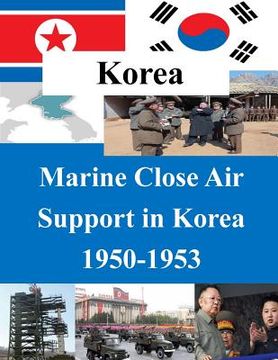Share
Marine Close Air Support in Korea 1950-1953 (in English)
School of Advanced Airpower Studies Air
(Author)
·
Createspace Independent Publishing Platform
· Paperback
Marine Close Air Support in Korea 1950-1953 (in English) - School of Advanced Airpower Studies Air
$ 11.96
$ 14.95
You save: $ 2.99
Choose the list to add your product or create one New List
✓ Product added successfully to the Wishlist.
Go to My WishlistsIt will be shipped from our warehouse between
Wednesday, July 10 and
Thursday, July 11.
You will receive it anywhere in United States between 1 and 3 business days after shipment.
Synopsis "Marine Close Air Support in Korea 1950-1953 (in English)"
This book examines the historical record and primary source of conflict between the armed services over the issue of the effective employment of close air support during the Korean War. The study considers the impact of the single air asset manager on CAS employment during World War II, Korea, and Vietnam. The disagreement examined and explained in this study is the distinction and desire between the Navy-Marines control system and the Army-Air Force control system. The author evaluates the development of service and joint doctrine and the arguments over centralized and decentralized command and control in the execution of the air war. The book emphasizes CAS issues during the Korean War using General Keith B. McCutcheon's writings and papers as a guide to develop and understand CAS employment, methodology, and effectiveness from World War II through Vietnam. The Korean War period significantly shaped the persistent argument concerning CAS employment among Marines, sailors, airmen, and soldiers and its value to a winning strategy. This book emphasizes General McCutcheon views on CAS employment and how he provided a template for cooperation during the Philippines Campaign. Cooperation and coordination as well as the role of doctrine are the primary themes through out this study. Doctrine, and coordination and cooperation are necessary tools to develop the most effective means of employing CAS.The most important thing in any of the cases studied was not which system was used for close support but that the system had to satisfy three minimum requirements for adequate CAS: 1) The system must permit the battalion commander to request emergency air support directly from the control center; 2) it must provide for the availability of aircraft over the target area within minutes; and 3) it must provide a competent air controller in a forward observation post where he can see friendly front lines, the aircraft, and the target to direct a strike to occur generally at a range of 50 to 500 yards from friendly lines. The secret to successfully achieving these three requirements in CAS operations is teamwork, coordination, and determination to make the system work. The level of commitment at the highest level of command, down the chain, weighs heavy on success or failure. While doctrine plays a critical role in focusing direction and effort, the situations will influence the application of doctrine.
- 0% (0)
- 0% (0)
- 0% (0)
- 0% (0)
- 0% (0)
All books in our catalog are Original.
The book is written in English.
The binding of this edition is Paperback.
✓ Producto agregado correctamente al carro, Ir a Pagar.

